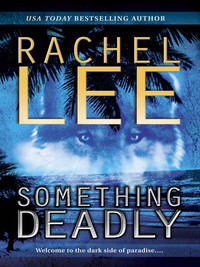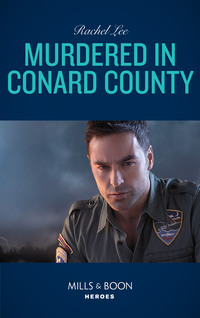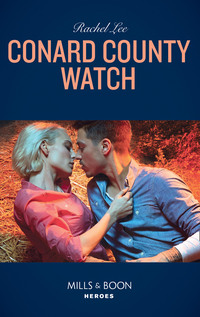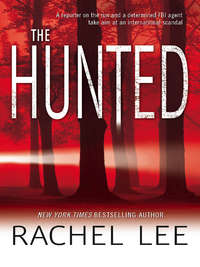
Полная версия
A Soldier In Conard County

He’s honoring a fallen friend...
but never expected to fall in love.
When he first arrives in Conard County, Sergeant Gil York is licking the wounds of combat—and mourning a beloved friend. But when he meets his fallen buddy’s cousin, Miriam Baker, the troubled hero feels alive in a way he hasn’t in years. Gil’s walls are high...but Miri might just be the one to scale them, right into his heart.
RACHEL LEE was hooked on writing by the age of twelve and practiced her craft as she moved from place to place all over the United States. This New York Times bestselling author now resides in Florida and has the joy of writing full-time.
Also available by Rachel Lee
Undercover in Conard County
Conard County Marine
A Conard County Spy
A Secret in Conard County
Conard County Witness
Playing with Fire
Undercover Hunter
Snowstorm Confessions
Visit millsandboon.co.uk for more information
A Soldier in Conard County
Rachel Lee

www.millsandboon.co.uk
ISBN: 978-1-474-07729-3
A SOLDIER IN CONARD COUNTY
© 2018 Susan Civil Brown
Published in Great Britain 2018
by Mills & Boon, an imprint of HarperCollinsPublishers 1 London Bridge Street, London, SE1 9GF
All rights reserved including the right of reproduction in whole or in part in any form. This edition is published by arrangement with Harlequin Books S.A.
This is a work of fiction. Names, characters, places, locations and incidents are purely fictional and bear no relationship to any real life individuals, living or dead, or to any actual places, business establishments, locations, events or incidents. Any resemblance is entirely coincidental.
By payment of the required fees, you are granted the non-exclusive, non-transferable right and licence to download and install this e-book on your personal computer, tablet computer, smart phone or other electronic reading device only (each a “Licensed Device”) and to access, display and read the text of this e-book on-screen on your Licensed Device. Except to the extent any of these acts shall be permitted pursuant to any mandatory provision of applicable law but no further, no part of this e-book or its text or images may be reproduced, transmitted, distributed, translated, converted or adapted for use on another file format, communicated to the public, downloaded, decompiled, reverse engineered, or stored in or introduced into any information storage and retrieval system, in any form or by any means, whether electronic or mechanical, now known or hereinafter invented, without the express written permission of publisher.
® and ™ are trademarks owned and used by the trademark owner and/or its licensee. Trademarks marked with ® are registered with the United Kingdom Patent Office and/or the Office for Harmonisation in the Internal Market and in other countries.
www.millsandboon.co.uk
To all the men and women who have made sacrifices the rest of us can’t begin to comprehend.
May you find comfort.
Contents
Cover
Back Cover Text
About the Author
Booklist
Title Page
Copyright
Dedication
Prologue
Chapter One
Chapter Two
Chapter Three
Chapter Four
Chapter Five
Chapter Six
Chapter Seven
Chapter Eight
Epilogue
Extract
Prologue
Followed by a smaller car, the hearse backed up behind Watkins Funeral Home on Poplar Street in Conard City, Wyoming. The old Victorian-style mansion looked fresh in every detail, although buildings around it appeared a little shabby.
As the hearse stopped, the driver climbed out of the following car. Wearing the ASU blue army uniform—dark blue coat and lighter blue slacks with a gold stripe running up the side of them—he stood staring at the nondescript white double doors bearing the discreetly lettered sign Arrivals. His many ribbons gleamed on his chest, and his uniform sported the insignia of the special forces and paratrooper. His upper arm patch ranked him as a sergeant first class; five golden hash marks on the lower sleeve recorded at least fifteen years of service. A brass nameplate identified him as “York.” He stood tall and straight, every line of him like a fresh crease.
Then he settled his green beret on his head, squaring it exactly from long experience. The driver exited the hearse and went to knock on the door. Sgt. York had brought home the body of his best buddy, Al Baker, and he intended to ensure that everything was done right.
The funeral director was waiting. Gil York watched as the flag-draped coffin was rolled indoors on a table, then followed when it was moved to a viewing room and placed on a blue-skirted catafalque. There would be no open coffin. If anyone in the family wanted to see, Gil would prevent it. Some things should not be seen.
“I’ll notify the family he’s here,” the funeral director said in a quiet voice.
Sgt. Gil York nodded. “You arranged the honor guard?”
“We have a group of vets in the area who do the honors,” the director said.
“The bugler?”
“Sgt. Baker’s cousin wants to play ‘Taps,’” the director said. “She teaches music at the high school.”
From gray eyes that resembled the hard Western mountains, Gil looked at him. “It’ll be difficult. It’s tough even when it’s not your own family.”
The director nodded. “I warned her. She insists.”
* * *
An hour later, the viewing room began to slowly fill with quiet, sad life. Sgt. York, now wearing white gloves, stood at the foot of the coffin, still at attention, his beret tucked under his arm, surrounded by the flowers the funeral director had arranged. Quiet voices murmured, as if afraid of disturbing the dead.
Gil stared straight ahead, but he wasn’t really seeing the room or the people. Instead he was seeing the years he had known Al Baker, filled with dangerous, tense, funny and good memories. His brother-in-arms. His friend through it all.
The flowers reached through his memories, sickeningly sweet. Al wouldn’t have liked them. He’d have understood the need for people to send them, but he still wouldn’t have liked them.
What he would have liked was the battlefield cross: the empty boots, the nose-down M-16, his green beret resting on the butt. His buddies had planted one for him in the Middle East at their base camp, and Gil had constructed one here, with a variation: he’d covered the rifle butt not with a helmet but with Al’s green beret, a symbol they had worked so hard to win and of which they had both been very proud.
One more day, Al, he thought. Just one more day and you’ll be at rest. No more traveling, no more being shunted all over the world. Peace at last, the peace they had both believed they’d been fighting for all along. Not the right kind of peace, but peace anyway. Gil wasn’t sure if there was a heaven. He’d seen too much of hell in his life, but if there was a heaven, he was certain Al was standing post already, free of fear and threats.
His eyes closed for a moment, and Al seemed to stand before him in full dress uniform. Straight and squared away and...smiling.
Godspeed.
The murmuring voices suddenly fell silent. Instantly alert, he turned his head a little and saw a man and woman walking toward the coffin. The woman wore black and leaned heavily on the man’s arm.
Al’s parents. He recognized them from photos. At once he pivoted so he faced the room and the approaching couple. Al’s mother made no attempt to conceal the tears that rolled down her face. His father looked grim, and his jaw worked as he clung to self-control.
The couple approached the flag-covered coffin, and Betsy Baker reached out a hand to touch it. “I want to see him.”
Gil tensed, wondering if he would have to warn her off.
The funeral director hurried over and took her hand gently, sparing Gil the necessity. “Please, Betsy.”
“I want to see him,” she repeated brokenly.
Gil nearly stepped forward. The funeral director spoke first. “No. You don’t.”
Then Betsy startled Gil. She turned her head, and her brown eyes, so like Al’s, locked with his. “You’re Gil, aren’t you?”
“Yes, ma’am.”
“I can’t see him?”
Gil broke his rigid posture and went to the woman’s side, taking her hand from the funeral director. “Mrs. Baker, Al wouldn’t want you to see him now. He’d be very grateful if you didn’t. Trust me.”
“Sgt. York is right,” said Mr. Baker, speaking for the first time. “He’s right, Betsy.”
The woman squeezed her eyes closed and more huge tears rolled down her face. “All right,” she whispered. “All right.” Then her voice strengthened. “There’s a supper afterward, Gil. Please come. I’m sure Al would like that.”
“Yes, ma’am.”
Then he resumed his post, rigid as steel, all the barriers back in place. Little could touch him there, and there he remained. Service tomorrow at two. Interment at three. Then back to base.
He’d done this before. He wanted never to do it again.
* * *
At graveside the next day, Miriam Baker, Al’s younger cousin, stood nervously by the riflemen who were part of the honor guard. She knew most of the guard because they lived in the county, and they’d let her know exactly what to expect and when she was to play her trumpet. They’d bucked her up, too, assuring her she’d do just fine. She wasn’t nearly as certain as she pretended to be. Al’s loss had carved a hole in her heart that kept tightening her chest at unexpected moments. If that happened while she played “Taps”...
Another car arrived, one she didn’t recognize. It stopped in an area away from the gravesite. Then, unfolding from it, was a tall man in army blue, with white gloves on his hands and a green beret that he immediately put on his head. For a moment, he stood surveying the scene: six uniformed pallbearers waiting beside the gravel road. The three riflemen near her.
Gil York. It had to be, even though he hadn’t come to the supper last night.
All of a sudden she felt seriously inadequate. The wind whipped her navy-blue concert gown around her lower legs as if trying to pick her up and sweep her away. Only the familiar weight of the trumpet in her hand pinned her to the ground.
Gil York was Al’s best friend. Everyone had known in advance that he was bringing Al home. He was also the NCOIC, according to Wade Kendrick and the other vets who had gathered around her extended family in the days since the news arrived. Noncommissioned officer in charge. He would be making sure the entire honor guard did a clean and perfect job.
And then there was her. She could feel his gaze fixate on her. He exchanged salutes with the pallbearers as he passed them, said something that caused them to relax for a moment.
Suddenly, he was standing in front of her, looking as if he’d been carved from granite and put in that dressy uniform. “Ms. Baker,” he said. “I’m Gil York.”
“I know,” she answered, her mouth suddenly dry. “I’m supposed to stand thirty to fifty yards away, right?” Cling to the orders for the day, try not to think too hard about her loss. Everyone’s loss.
“That’s not as much my concern, ma’am, as you are.”
“Me?” Her voice cracked. She was not ordinarily a mouse, but since word had been delivered that Al had been killed, a lot of things seemed to have turned topsy-turvy.
“‘Taps’ is very difficult to play, Ms. Baker. And I don’t mean musically. This is going to be very difficult for you emotionally. If you have any doubt about your ability, let me know. I have the authorized digital recording with me.”
Her back stiffened a bit. “It’s something I can do for Al. I want to do it. I’ll cry later.”
Their eyes locked, hers as blue as the summer sky, his as gray as rain-wet slate.
“Very well,” he said after a few stretched-out seconds. “If you change your mind, just let me know.” Then he turned to the riflemen, who told him they’d already picked out the location for them and for Miri.
Sgt. York approved, saluted and started to pivot away. Suddenly he turned back. “Commander Hardin?”
Seth Hardin, decked out in dark navy blue, smiled faintly. “It’s been a while, Sergeant.”
“Yes, it has.” He nodded, then pivoted and marched away.
There was steel in the man’s spine, Miriam thought. She wondered if he ever walked normally, or if he was forever marching, executing tight corners and sharp about-faces.
Not today. Certainly not today.
She and the riflemen backed up to the small knoll Seth Hardin had chosen for them. Thirty to fifty yards from the gravesite for them and the bugler. Apparently, everything was measured out with these formalities.
She only wished she had a real bugle, but the trumpet was acceptable. At least she was sure she could play it.
Events began to blur. The hearse arrived. Family and friends crowded into the chairs that had been set up at the gravesite. The grave itself was covered by the machinery that would lower Al into his resting place later. For now, everything was hidden beneath a blanket of artificial turf, shockingly green against the duller, dry countryside.
Then she heard commands being barked. The moment had come. Six men in uniforms of various services eased the coffin from the back of the hearse and carried her cousin with measured steps to the grave.
Miri’s throat tightened until she felt as if a wire garrote wrapped it. She drew slow breaths, calming herself. Weeping could come later. She had a service to perform for Al.
The minister spoke a few words, led them in a prayer. Then Sgt. York turned toward the distant riflemen and saluted. Even though she stood ten yards from them, Miri could hear the snap as they brought their rifles up and aimed them to the sky.
A command was spoken and three rifle volleys rang out, one after the other. Then, with a snap, the rifles returned to a position that crossed the men’s chests.
She glanced toward York and saw him waiting at attention. Her turn. She lifted the trumpet and began playing the sorrowful notes for Al. A hush seemed to come over the entire world. She didn’t notice that tears ran down her cheeks. Had no way to tell that no eyes were dry as the lonesome call carried over the countryside.
She made it all the way through. Tears nearly blinded her as the pallbearers stepped forward, folding the flag with perfect precision before handing it to Sgt. York. He pivoted sharply and walked to stand directly before Al’s parents. With the flag at waist height he bent forward and spoke, his determined voice carrying on the stirring breeze.
“On behalf of the president of the United States, the United States Army and a grateful nation, please accept this flag as a symbol of our appreciation for your loved one’s honorable and faithful service.”
Mrs. Baker took the flag and held it to her chest, her sobs becoming audible.
Then the entire honor guard withdrew, leaving the family to its private time of grief.
Something made Miri run, her trumpet case banging against her leg. She didn’t run away, but rather straight to Sgt. York, who was about to climb into his car.
“Sergeant!” she called. Her voice sounded disturbingly loud, but she didn’t care. He’d been Al’s friend. These moments were for him, too.
He paused, then pivoted to face her. Still the stern-faced soldier. “Yes, ma’am?” he asked quietly when she reached him.
“You can’t just go. Please at least let us know how to contact you. Al’s stories...well, we feel like you’re part of the family, too.”
He hesitated a moment. “Do you have a pad and pen? There’s very little I can fit into a dress uniform without looking sloppy.”
“I imagine.” She was in a luckier position. Her trumpet case contained the paper and pen. He scribbled down an email address. Nothing more. It was enough. “Thank you. Thank you for everything.”
“No need. Al deserved a whole lot more.” Then he opened the car door and removed a paper-wrapped parcel, the size of a large book. “Give this to Al’s mother and father, please. I had a bunch of photos I thought they’d like. I was going to mail it but... You did well, Ms. Baker.”
Then he climbed in the car and, like the rest of the honor guard, disappeared from sight.
Miri stood holding the wrapped package, sorrow and loss emptying her heart. She missed Al like the devil. But she suspected Gil York missed him even more.
Chapter One
Miri Baker waited nervously. Gil York was arriving sometime this evening. Yes, they’d kept up a casual email correspondence since Al’s funeral last year, but then he’d dropped out of sight for over two months.
When he resurfaced he’d told her he’d been wounded and that, after rehab, he’d be going home to his family in Michigan.
She wondered what had happened there, because out of the blue, just a week ago, he’d asked if the family would mind a visit from him. After clearing it with Al’s parents, she assured him they’d love it, and his response had been brief. “See you Friday evening.”
In the few messages they’d traded since he told her he’d been wounded, there had been a lot of blanks, missing lines, little information. She had no idea what to expect, or why he’d leave his family and come here.
She had a casserole ready to go, since his arrival time was up in the air. She had some lesson planning to do, but it could wait. She paced her small house and hoped that everything would be all right.
She had no idea how badly wounded Gil had been. What was he going to say when he learned that Al’s family was throwing a big barbecue for him tomorrow? A barbecue in January because of a brief thaw. He wouldn’t be expecting that. What if he didn’t want to go?
“Simple enough,” Betsy, Al’s mother, had said as she gave her phone a workout. “We’ll have the barbecue anyway. Everyone will have a good time.” Especially since no one thought of holding barbecues at this time of year, thaw or no thaw. In a pinch, the barn would do for shelter.
It was nearly a year since the funeral, and when Miri thought over the simple, short emails she and Gil had exchanged, she felt that now he was even more a stranger than he had been when Al had shared stories about him.
“Reserved” might be an understatement when describing Gil York. From the little she had seen of him at the funeral, she would now describe him as distant. Maybe even closed off. She had a feeling that during their brief meeting she’d had her first close encounter with what she’d heard called the “thousand-yard stare.”
She’d talked about it with Edie Hardin, a former combat search and rescue pilot who now worked for the county’s emergency medical services as a helicopter pilot. The woman had a son who had frequent play dates with Miri’s next-door neighbor’s son, and Edie and Miri had developed a friendship over time.
“I know what you mean,” Edie had answered. “I’ve seen it plenty of times.” She had missed the funeral because she was on duty that day, but her husband, Seth, a former SEAL, had been part of the honor guard.
“I see it in Seth sometimes,” Edie had continued. “What these guys do? Especially special forces like Seth and Gil...so much, for so long. It’s like a brain shock, or an emotional shock. It haunts them, Miri. Anyway, don’t worry about it. Gil seems to have a handle on it, from what you said.”
Handle on it? Truth be told she was surprised he’d continued their irregular email conversation. Little said on his side, while she tried to pass along interesting tidbits about life around here. She kept expecting him to just not answer.
Then for two months he hadn’t. It had been a shock to her to learn he’d been wounded and that he was on indefinite medical leave. An even bigger shock when he’d written that he’d like to visit, if that was all right.
Of course it was all right. He’d been Al’s best friend for years. By extension he was family. But what about his own family, where he’d been headed when he first told her he was wounded?
As the sun slipped behind the mountains and the afternoon began to darken into twilight, she decided she was getting entirely too anxious about Gil’s visit. He was probably just taking the opportunity to do a little traveling while he was on leave. He undoubtedly knew people from all over the country and was catching up. Considering that Al had been one of his best buddies, he probably wondered how the Baker family was getting along.
Losing Al still hurt. Grief, she was discovering, never really lessened; it just came less often. Like ocean waves, rolling over her occasionally, sometimes softer, sometimes hammering. Talking with his parents, she’d found they were experiencing the same thing, only much more painfully. Their only child? Indescribable.
The folded flag took pride of place beside Al’s official portrait on the Bakers’ mantel over the fireplace. Around it were all the presentation cases holding Al’s medals, and a white votive candle that was never allowed to go out. Miri had offered recently to get all the medals mounted and framed—an expensive proposition, to her surprise—but they hadn’t decided yet.
The Baker family continued to move forward with life, because that was what the living had to do, but Miri couldn’t escape the feeling that part of Betsy, and maybe Jack, as well, had been frozen in time, at the moment they’d learned of Al’s death.
Jack was still running the ranch; his grief didn’t diminish realities. Yet some light in him was gone.
Maybe that was what was going on with Gil. Some light had been extinguished. Well, how would it be possible to spend sixteen or more years fighting for your country on dangerous and covert missions, without a bit of your internal light going out?
Then she realized why she was so on edge, and it had little to do with Gil personally. It had to do with the concern that his visit was going to freshen a grief they all, particularly Al’s parents, had been gradually learning to live with.
Outside, the January thaw had thinned the snow to almost nothing. Icicles were beginning to drop from the eaves, tiny spears for the most part, probably a good size for leprechauns.
The day faded rapidly toward early night. Miri hated waiting, but she couldn’t seem to do anything else just then. Finally, after what seemed like forever, a dark-colored car pulled up out front. A few minutes later she recognized the unmistakable figure of Gil York.
He looked different out of uniform, wearing a black parka, and as he came around the front of the car, she realized everything about him had changed.
The ramrod-straight posture and confident movement she associated with him were gone. He walked a bit gingerly, using a cane. He wore laced-up desert boots and camouflage pants beneath the parka, an odd assortment of pieces, and she wondered if the camo was simply comfortable, preferred over jeans or regular slacks.
He caught sight of her as she opened the door and gave a small wave. She noticed how deliberate his pace remained and the caution with which he navigated the sidewalk and the porch steps.
“It’s good to see you again, Gil,” she said when he reached the porch. She noted that sweat had beaded on his forehead, and it wasn’t an especially warm day, thaw or not. That walk must have been difficult.









